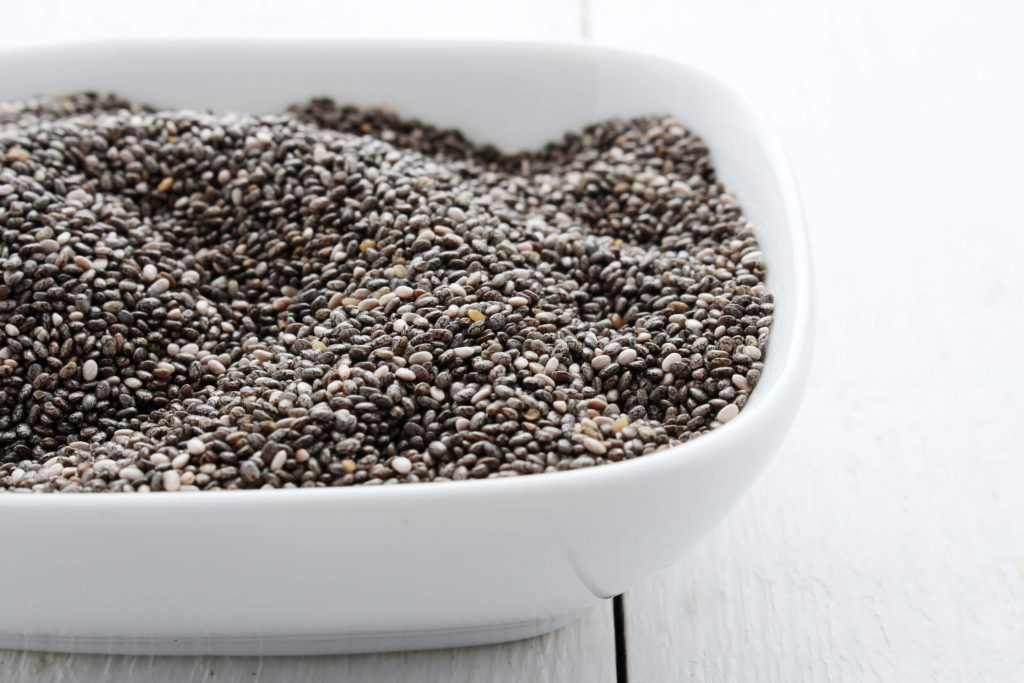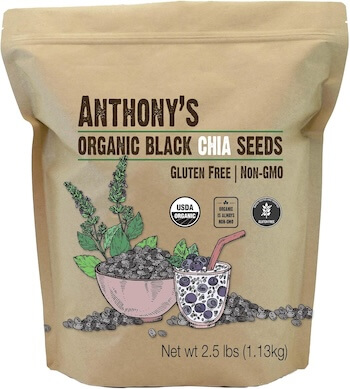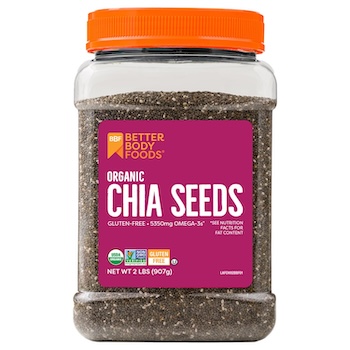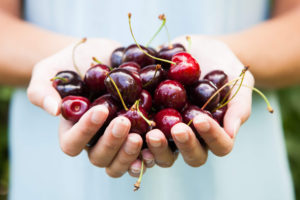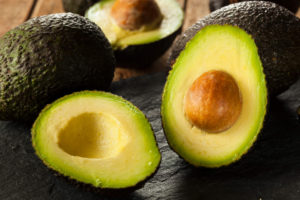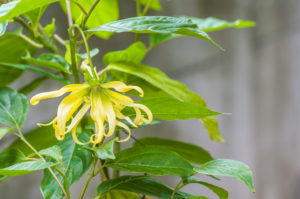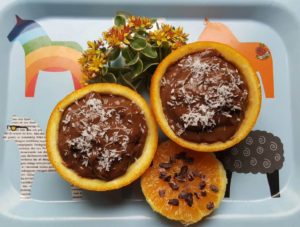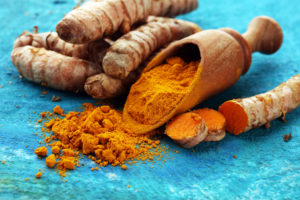Chia seeds have served as a prominent dietary staple for many cultures for hundreds of years. The Aztec Warriors used to eat them before a battle or a long-distance run as they were considered a great energy source. The nutritional profile of the chia seed is unique and delivers a powerful punch of nutrients within a small serving. They are derived from the Salvia Hispanica plant – a relative of mint that grows in South America. They are tiny and black or dark brown in appearance.
Let’s dive in and take a closer look at some of their nutritional components.
Fiber
Just a small one-ounce serving of chia seeds contains a whopping 11 grams of fiber – more than a third of the recommended daily intake. Fiber is essential for maintaining a healthy weight, a correctly functioning digestive system, and eliminating toxins.
Omega-3s
Chia seeds offer one of the highest plant-based sources of omega-3 fatty acids. Omega-3s are imperative for health, cardiovascular well-being, and controlling inflammation. However, the omega-3s in chia seeds are in ALA (Alpha Linoleic Acid) form, not DHA. ALA omega-3s require conversion from the body. Therefore, other sources of DHA omega-3s are needed in either food or supplement form.
Minerals
Chia seeds are high in magnesium, manganese, and phosphorus. In addition to those great minerals, the calcium content of these minuscule little seeds is particularly noteworthy – 18% of the recommended daily intake in just one ounce. For those avoiding dairy, chia seeds provide an excellent source of calcium!
| MINERAL | UNIT | PER 100 GR CHIA |
|---|---|---|
| CALCIUM | MG | 714 |
| POTASSIUM | MG | 700 |
| MAGNESIUM | MG | 390 |
| COPPER | MG | 0.2 |
| IRON | MG | 16.4 |
| MANGANESE | MG | 2.3 |
| SODIUM | MG | 2.1 |
| ZINC | MG | 3.7 |
| PHOSPHORUS | MG | 1067 |
| ALUMINUM | MG | 2.0 |
| BORON | MG | 1.4 |
B-Vitamins
Chia seeds are a potent source of vitamin B1, B2, and B3. B vitamins are necessary for the body’s ability to convert food into energy and maintaining a healthy metabolism. B3 also plays a large part in managing cholesterol, and adequate intake has been shown to lower the risk of developing Alzheimer’s, osteoarthritis, and type-1 diabetes.

Antioxidants
Antioxidants help protect against damage caused by the production of free radicals – which can contribute to the development of various diseases such as cancer. Chia seeds are a potent source of antioxidants.
Blood Sugar
Chia seeds have been shown to decrease insulin levels in the blood, making them an excellent addition to the diet for those living with blood sugar issues such as hypoglycemia or diabetes.
Other non-nutritional but non-the-less fantastic benefits of chia seeds:
They are incredibly shelf-stable and can last up to two years without refrigeration. With their high nutritional content, which is often low in shelf-stable foods, chia seeds make the perfect addition to the pantry or emergency food supply. They are great to buy in bulk and store in glass jars for whenever you may need them.
Chia seeds have a natural gelatinous texture that develops when they are mixed with water or another liquid. Therefore, they can successfully be used as a replacement for eggs in some recipes, and are often used as a natural thickener for jams and puddings.
These tiny seeds are naturally gluten-free, grain-free, dairy-free, and soy-free. This makes them an ideal choice for anyone who is on a limited diet due to food allergies, autoimmune disease, or any other health ailment requiring a modified diet.
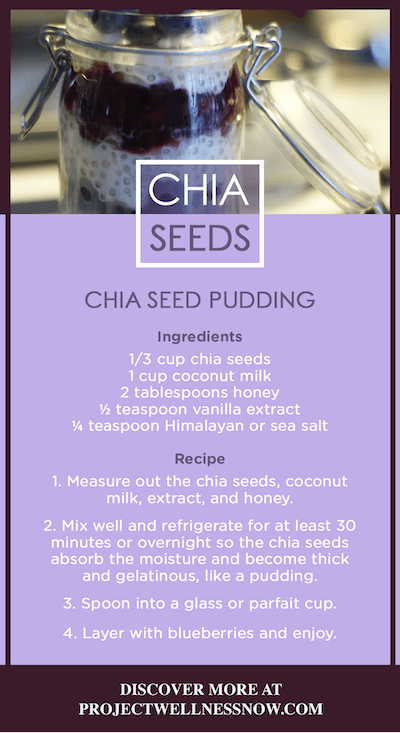
Chia seeds are astonishingly easy to add to your diet. They can be sprinkled on cereal, oatmeal or vegetable dishes. They can also be added to juice or used in baked goods.
As it turns out they are far more than just the source of the fuzzy green sprouted fur on those terracotta animals and celebrity-shaped figurines that have been around since the early 1980s. Nope, the benefits of chia seeds are much farther-reaching!
References:
Borneo R, Aguirre A, León AE. Chia (Salvia hispanica L) gel can be used as egg or oil replacer in cake formulations. J Am Diet Assoc. 2010 Jun;110(6):946-9. doi: 10.1016/j.jada.2010.03.011.
http://www.authoritynutrition.com
http://www.nsrinews.com/nsriChia_research.html, Chia (Salvia hispanica L)
http://www.ncbi.nlm.nih.gov/pmc/articles/PMC3518271/ The Promising Future of
Chia, Salvia hispanica L.
http://care.diabetesjournals.org/content/30/11/2804.long, Supplementation of
Conventional Therapy With the Novel Grain Salba (Salvia hispanica L.) Improves
Major and Emerging Cardiovascular Risk Factors in Type 2 Diabetes
YOU MAY ALSO LIKE:
WHAT ARE CHERRIES GOOD FOR?
Cherries are packed with healthy nutrients, minerals, vitamins, and antioxidants. Their low-calorie content makes them a perfect snack that you can…
HOW TO START MAKING YOGA A DAILY HABIT
By Kevin JonesYou likely know that yoga can provide you with a variety of benefits, from helping you increase your flexibility…
AMAZING AVOCADOS!
Wholesome, filling, flavorful, and versatile – avocados seem to have it all. Due to their nutrient density and creamy consistency, avocados…
YLANG-YLANG – THE QUEEN OF ESSENTIAL OILS
As frankincense is the King of Essential Oils, Ylang Ylang is the Queen. Ylang-ylang oil is extracted from the flowers of…
RAW CHOCOLATE ORANGE PUDDING
This recipe is for all the fellow chocoholics out there! INGREDIENTS:1 medium-size ripe avocado1/4 cup almond/hazelnut milk2 Tbs raw cacao powder1 tsp…
TURMERIC -THE HOLY POWDER OF AYURVEDA
Turmeric is widely used in India, China, Taiwan, Sri Lanka, and many other nearby countries. Since its uses have never been…

